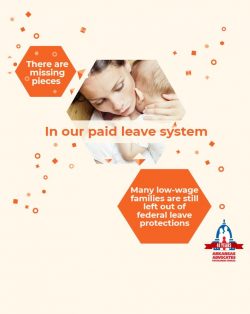
If you take time off to care for a newborn, or recover from a serious illness, in most cases your employer can’t simply fire you. This is the way it should be, of course, but it wasn’t the case before passage of the Family Medical Leave Act (FMLA). The landmark employee protection law was signed 25 years ago today, on February 5, 1993.
As we celebrate this anniversary, it’s important to remember that the law still leaves many workers out. It requires most employers to provide up to 12 weeks of unpaid leave, but people who work for smaller companies aren’t eligible. On top of that, low-wage workers are effectively excluded because they often can’t afford to go that long without a paycheck. For them, unpaid leave isn’t a luxury they can afford.
The way to correct this disparity is to enact more comprehensive leave policies that offer paid – not unpaid – time off.
Some states are stepping up to the plate. Arkansas, for example, now provides paid maternity leave to state employees. The situation in the private sector, however, is a lot murkier. More and more businesses have been rolling out paid leave policies over the past several years, which is good. But a lot of those policies only apply to upper-income workers within those companies, which is bad.
Overall, 94 percent of low-wage workers, who tend to be in hourly, part-time, or field jobs, still don’t have any access to paid leave.
Very recently, some companies have come around to policies that help their employees while crediting the recent federal corporate tax cuts for making it all possible. It is wonderful to expand benefits that help families, but we need to recognize the truth: these benefits are rarely as good for low-income workers as they are for salaried employees. Moreover, companies could have, and should have, been using better policies all along.
It is misleading to imply that large corporations can only afford to treat their workers well now because of these federal tax cuts. Corporations publicizing their generosity in this way happen to get billions of dollars more in tax giveaways than they will ever spend on new perks for their workers. Is it great that more people have access to basic benefits like paid leave? Of course. Should we thank corporate tax cuts for it? Absolutely not. Most of the benefit of corporate tax rate cuts go to, not surprisingly, the people who own and run corporations – not the workers.
If the only thing standing between a corporation and fair labor practices was net profits, then U.S. companies should have been leading in this regard for a long time. Large U.S. corporations had record profits before this tax change, and in many cases have large built-up cash reserves. There is no reason to think that “tight budgets” were the reason for holding back on responsible employee benefits.
Corporations with paid leave policies, no matter how unfairly distributed, also get to double dip from the recent federal tax cuts. The so-called paid leave in the federal tax cut package is just a second, smaller, form of giveaway to large, profitable corporations. The credit covers a very small amount of the expenses related to providing leave, and it is temporary – lasting only two years. Companies don’t make serious policy changes based on minor, temporary credits. The credit doesn’t provide incentives to companies to have better leave policies; it just subsidizes companies that already have them, even if those policies totally leave out hourly workers.
Paid leave is a good thing, but not everyone has access. We can’t count on corporate tax cuts, and the spotty and unpredictable reactions that private corporations have to them, to lead us to serious paid leave accessibility. We need thoughtful public policy. Some states, like Arkansas, are moving in the right direction by starting to offer their own forms of paid leave. At the federal level, the FAMILY Act, which is modeled after proven state initiatives, is another great option to fill in the gaps left behind by the FMLA and private companies. Let’s hope we don’t have to wait another 25 years.

